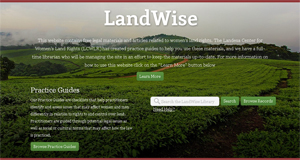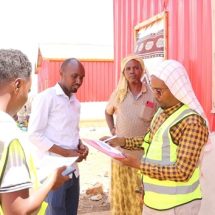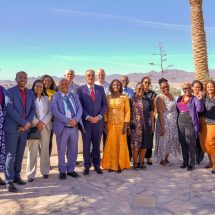A new free, user-friendly, searchable database that contains laws, articles, and practice materials related to women’s land rights is now available online.
The website, called LandWise, is a platform for training and capacity building. It includes practice guides and analytical frameworks to help users identify topics and issues that impact women’s land rights. These frameworks are available in an interactive online format, and can also be downloaded as Word or PDF documents.
LandWise has been produced and is maintained by the Landesa Center for Women’s Land Rights. Our program goal is to build capacity to promote approaches that strengthen and secure women’s land rights. Through LandWise we hope to provide lawyers, researchers, and development practitioners with tools to understand women’s land rights.
Our years of work around the world taught us that women’s land rights issues are multifaceted and complex. To work on these issues, practitioners and advocates must have a clear understanding of formal legal institutions and administrative mechanisms, as well as cultural norms and informal laws that influence behavior. A comprehensive understanding of the conditions under which women are living typically requires extensive in-country experience and/or field work. However, even before field work can begin, thorough desk research is needed.
We recognized that despite the vast amounts of information available on the internet, experienced development practitioners, policymakers, and advocates, as well as those new to the field, often find it difficult to locate relevant and up-to-date resources and materials. It is especially difficult to locate the laws that have the most relevance to women’s property rights: family laws, inheritance laws, and marital property laws. Knowledge of these types of laws is especially important for women’s land rights, because in many parts of the developing world, women’s access to land and other resources is primarily through their relationship to a male relative.
Understanding the text of specific laws that govern women’s property rights is important because the law is an expression of the will of the state, even if the law is not broadly known or followed. There are many reasons why a law may not be put into practice: it may not be known, the law may not be followed because it makes no sense in a specific situation, or perhaps the law is not socially enforceable. Good laws can be used to help bring about change, and policy recommendations cannot be made without understanding the legal framework first.












